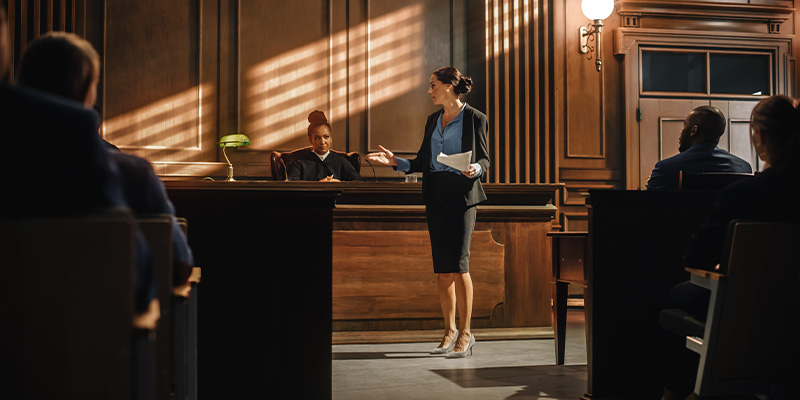CTI is proud to announce the opening of applications for the 14th edition of the Online Master’s in Legal Translation on Zoom.
Il Master
Legal Translation and Career Opportunities
When translating legal texts, you need not only excellent language skills but also extensive knowledge of law. In order to provide a high-quality, accurate service, a translator’s education must be complemented by specific skills, such as specialised technical translation techniques, knowledge of law and comparative law and proficiency in the stylistic and lexical conventions that characterise legal texts.
With the increase in business ties outside of Italy, a globalisation of legal and economic interests of companies has taken place. This means that businesspeople and consumers are confronted with the issue of managing potentially problematic documents, not only because they are written in a foreign language, but also because they reflect legal systems and institutions that bear little resemblance to their own. As a result, there has been a constant growth in the demand for legal translation and interpreting services, where the high expectations of customers must be met with equally high quality.
How to acquire a specialisation
CTI, with its 48 years of experience as a leading language service provider in the Italian market, offers its high-level specialising Master’s in Legal Translation from English into Italian in partnership with L&D Traduzioni Giuridiche.

What is the target audience of the Master’s?
The Master’s is designed for graduates of translation and interpreting or languages who wish to specialise in the legal sector and for translators and interpreters who have just begun their professional career and wish to perfect their skills in this field. The course is also aimed at more experienced language professionals who want to consolidate their legal translation skills or even acquire a further specialisation.
The Master’s is also open to lawyers or trainee lawyers, law graduates and other university graduates who regardless of their education have acquired good language skills and want to specialise in the legal sectors.
Teachers and course structure
The Master is held by the lawyer/linguist Dario Mazzardo and Luca Canuto, interpreter/translator.
Dario Mazzardo was admitted to the Milan Register of Lawyers and has been practising the profession since 2009. He mainly focuses in business law and intellectual property and is also a specialised teacher for lawyers, trainee lawyers and translators. Since 2019, he has been an adjunct professor for the SSML CIELS language university in Milan, where he teaches International Organisations, Planning of Peace Interventions, as well as Linguistic Mediation for the legal and administrative sector and the social and healthcare sector.
Luca Canuto has been a practising conference interpreter and translator since 1998 after graduating from the Scuola Superiore di Lingue Moderne per Interpreti e Traduttori of Trieste. He is a member of AITI and Assointerpreti, and was a lecturer in Linguistic Mediation, Liaison Interpreting and Simultaneous Interpreting from Dutch at the Civic School for Interpreters and Translators of Milan from 2002 to 2015. Since 2019, he has held the role of adjunct professor at the Limec SSML of Milan, where he teaches Introduction to English Interpreting, English Liaison Interpreting and Consecutive Interpreting into French.

Dario Mazzardo
Avvocato /Linguista

Luca Canuto
Interprete/Traduttore
Since 2010, they have been part of L&D Traduzioni Giuridiche, which was originally founded to provide specialised translation and interpreting services and then expanded to encompass education and training. In this context, they work together to offer seminars and lessons in legal translation from English into Italian aimed at universities, training bodies and practising linguists.
Since 2015, they have been lecturers of the six-month Master’s in Legal Translation from English into Italian organised by CTI.
The Master’s is structured around a highly innovative and unique methodological approach, based on the synergy between these two figures, each counterpoising and interacting with one another during the lectures, which are typically held by both teachers simultaneously. This solution allows students to acquire the necessary specialised skills in order to offer their customers translations that are not only correct in terms of content and terminology, but are also enhanced by reasoned and purposeful translation choices that perfectly match the language conventions of the target audience.
The course is split into a general section and a specialised section. The first section teaches students about the fundamentals of common law, which is the legal framework applied in most English-speaking countries, such as the United Kingdom and the United States of America. This system is then investigated comparatively against the civil law system, which is used in Continental Europe, in order to resolve the delicate and nuanced problems of legal translations from English into Italian in a reasoned and conscious manner. The second section takes a deep dive into the main legal disciplines.
Both during the general and specialised section, in addition to analysing the required elements of theory, participants will also have the chance to study the most common documents that are requested in the context of a translator’s real-word career. The majority of the documents analysed during the exercises are genuine artefacts, gathered from the practical experience of the teachers. This enables students to familiarise themselves with market demands and learn about the most effective solutions for offering high-quality products that are a cut above the rest.
Master
Master programme
1 Comparative law
1.1. Subjects of comparative law
1.2. Legal Transplants
2 Legal translation and the relationships between language and law
2.1. Interpretation of texts and knowledge of source and target legal systems
2.2. Possible translation solutions
3 Legal English in common law countries and as lingua franca in the EU (so-called Brussels English) and at international level
General section
Common law, sources of law, courts
1 The summa divisio between civil law and common law Essential characteristics of the common law system
1.1 United Kingdom
1.2 United States of America
1.3 Australia
2 Sources of law
2.1 England and Wales
2.2 Scotland
2.3 Northern Ireland
2.4 European Union
2.5 United States of America
2.6 Australia
3 Courts/tribunals (types of courts)
3.1 England and Wales
3.2 Scotland
3.3 Northern Ireland
3.4 United States of America
3.5 Australia
General section
Legal figures
1 Legal figures
2 Judges and public prosecutors
2.1 England and Wales
2.2 Scotland
2.3 Northern Ireland
2.4 United States of America
2.5 Australia
3 Lawyers (types of lawyers)
3.1 England and Wales
3.2 Scotland
3.3 Northern Ireland
3.4 Patent and trademark attorney in the United Kingdom
3.5 United States of America
3.6 Australia
4 Parties
4.1 Civil procedure
4.2 Criminal procedure
5 Other figures
Legal profession, law firms, deeds and documents, language and style, sworn translation and authentication
1 The legal profession
1.1 Legal education and training
1.2 Organisation of the profession
2 Law firms: structure and types
3 Legal deeds and procedure documents
3.1 Foundations of the structure of civil proceedings
3.2 Typical pleadings in civil proceedings
3.3 Foundations of the structure of criminal proceedings
3.4 Typical pleadings in criminal proceedings
3.5 Other procedure documents
4 Language and style of legal deeds
5 Sworn translation and authentication
Specialised section
Criminal law
1 Introduction: criminal law in common law countries
1.1 Fundamental concepts and categories. Qualification problems
2 Elements of crime. Criminal liability, criminal defences, excuse defences
3 Circumstances of crime
4 Participation in crime
4.1 Conspiracy
5 Types of punishment
5.1. United Kingdom
5.2. United States of America
5.3. Concurrence of crimes/offences: consecutive sentences and concurrent sentences
5.4. Two special principles: probation and parole
5.5. Pardon and amnesty
6 Criminal statutes of limitation
7 Crimes against the person
7.1 Homicides as overarching offence. Murder and manslaughter
7.2 Assault and battery
8 Crimes against property
8.1 Old offences of larceny, embezzlement and false pretences.
New overarching offences theft and fraud
8.2 Violent crimes against property: robbery and blackmail/theft by extortion
8.3 Receiving stolen goods/theft by receiving/handling stolen goods/receiving stolen property
8.4 Damage to property/criminal mischief
8.5 Crimes against property (real estate): criminal trespass, arson and burglary
Alternative Dispute Resolution Methods
1 Alternative Dispute Resolution. ICDR, ICC and UNCITRAL
2 Negotiation
3 Collaborative law/collaborative practise
4 Mediation and conciliation
4.1 Lawyer-supported mediation
4.2 Party-directed mediation
4.3 Mediation in the European Union
5 Arbitration
5.1 The New York Convention of 10 June 1958 on the Recognition and Enforcement of Foreign Arbitral Awards
6 Alternative dispute resolution clauses in international contracts
International private law and international commercial law
1 Introduction: difference between public international law and private international law.
Conflict of laws and choice of law
2 National and conventional international private law
2.1 The Hague Conference on international private law, UNCITRAL and the European Union
3 Function of international private law
4 Structure of conflict of laws rules
4.1 The problem of qualification in international private law
4.2 Connecting factors/contacts and grounds of jurisdictions
4.3 Dépeçage or ‘dismemberment’ of international laws
5 Principles of conflict of laws rules
5.1. Renvoi
5.2 Plurilegal systems/composite legal systems
6 Limits to applying foreign laws declared as competent
This edition will also be conducted by means of
LIVE REMOTE LESSONS ON ZOOM
- being far away from Milan is not an issue
- our previous students agree: the live lessons are enjoyable thanks to our well-prepared teachers who are approachable, competent and can make 8 hours of lectures interesting and engaging
Learning material
The application fee includes the following learning material:
- explanatory slides of the covered topics. which will be used during lessons
- glossaries containing a selection of the most important terms and expressions for each topic in the Master’s
The application fee does not include the English to Italian legal translation handbooks written by the teachers, in e-book format, which must be purchased separately:
- DARIO MAZZARDO (in partnership with LUCA CANUTO), Manuale di traduzione giuridica dall’inglese all’italiano – Parte generale, 2018
- DARIO MAZZARDO (in partnership with LUCA CANUTO), Manuale di traduzione giuridica dall’inglese all’italiano – Parte speciale, 2018
After completing your application process, you will receive information on how to buy these items.
These legal translation handbooks are a distillation of the teaching experience acquired by L&D Traduzioni Giuridiche in the context of training they provided over the years to translators and interpreters. The handbooks are highly specialised and are specifically designed for people who wish to specialise in legal translation from English into Italian. They are one-of-a-kind books which – as they are structured – cannot currently be found in the market. The books are a combination of theory and practice and contain both elements of comparative law (comparison between the main common law system and the Italian legal system) and references and in-depth language analyses. The authors have enriched this learning experience with language focuses (examining typical terms from different legal systems from a linguistic and grammatical perspective), words in context (in which English terms referring to common law principles are shown in a real-word example) and translation tips (which suggest possible translation strategies for the most problematic cases). The handbooks are divided into a general and specialised section. The general section consists in an appraisal of the fundamental characteristics of the main common law jurisdictions – mainly from the standpoint of public law – in comparison with the Italian legal system: sources of laws, courts, figures and parties in civil and criminal proceedings and the relevant deeds and documents. Accordingly, the general section also analyses linguistic, terminological and translation issues arising out of the covered areas, with a special focus on the language and style of legal documents and some practical references to sworn translation and authentication. The specialised section focuses on the most important fields of law, both from a comparative standpoint and with regard to the content, and from the perspective of language, terminology and translation strategies. Most of the covered topics pertain to private law – however, the essential elements of criminal law are also unpacked. Specifically, after exploring criminal law in the first chapter from a general perspective, the following chapters of the specialised section each inquire into a specific area of civil and commercial law, ending where possible with a focus on the main crimes relating to the individual areas examined.
Methods of attendance
Live remote lessons on Zoom.
Participation requirements
Excellent knowledge of English.
The maximum number of students is 20. Processing and confirmation of applications occurs on a first come first served basis.
Duration
September 19, 2023 – February 20, 2024
Schedule
Tuesday (only one day per week)
Timetable: 9.00-13.00 and 14.00-18.00
Applications
Applications must be submitted by 21 February 2022. Applications will be accepted until the course is full (maximum 20 participants). If you wish to apply after this date, please get in contact with the Masters’ Office. Along with your application, please attach a CV, a copy of your relevant education certificate and your payment receipt for the deposit.
Internships
At the end of the Master’s, the best students (who also fulfil all the legal requirements) will be offered the chance to complete an internship at language service providers and other companies in the economic and financial sector.
Advantages for participants
AITI and ANITI learning credits
Completion of any CTI Masters’ is recognised in the form of learning credits by AITI and ANITI. ANITI recognises all our courses, whether in-person, remote or pre-recorded, and AITI recognises out in-person and remote live-attendance courses.
Special section on the CTI website for the best students
In order to provide immediate visibility to the best students, the names of those with a final grade between 95 and 100 will be published on the CTI website.
Lombardy Association of Expert Witnesses
A pass grade in the final examination of the Master’s for Translators and Interpreters in Legal Translation will enable you to register with the Lombardy Association of Expert Witnesses – Foreign Language Category
RWS Discount – Trados and RWS training resources
Thanks to a special agreement with RWS, all of our students can buy RWS software (Trados) with a special exclusive discount.

Contatti
If you would like to make further enquiries, please fill out the form or contact the Masters’ Office.
Opening times: Monday to Friday, 09:00-13:00 • 14:00-18:000
(+39) 026691338
formazione@cti-communication.it
Fees and payment methods
Click on the hyperlink http://cti-communication.it/preventivo/iscrizione-master-online-economia-e-finanza/ to find the application form and the various payment options.
Once your payment has been processed, our Masters’ Office will create a personal account for the platform, using the e-mail address you provided during the application as your username. An invitation e-mail will be sent to the same address to activate the account: by clicking on the activation link, a new page will be opened and you will be asked to create a password. These access credentials are personal and therefore cannot be shared with others.
More information and free trial lesson
For more information about our training facilities and the programme, you can access a free trial of the lectures at https://cti-communication.aplearning.eu/.
The access credentials are the following:
e-mail: formazione@cti-communication.it
password: guest2021
Registered students will be able to download as PDF files the slide deck of all the lectures by opening the “Bookshelf” section on the pop-up menu at the bottom of the screen. To open it, click on the blue arrow.
The platform itself contains a detailed instruction manual.







